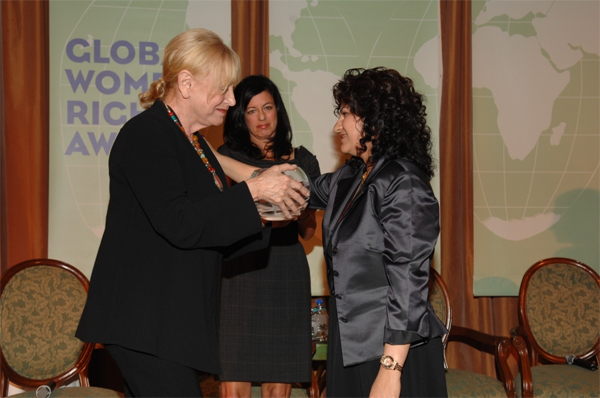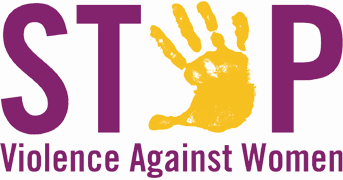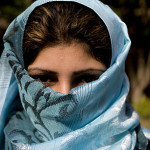It feels as if the entire world has been given over to the most perverse notions of ‘safety’ that are really about death and destruction, cruelty and conflict, grandiosity and greed. Marion Bowman reports from the Nobel Women’s Initiative conference in the Netherlands.
It was a classic image of protectiveness. The figure of a soldier stood, fatherly, silent, unyielding, over a seated woman, small, lovely, smiling. But it was not how it seemed. The soldier was a full-scale replica of one of China’s Terracotta Warriors, one of several being used as ornaments in a country house hotel in the Netherlands. The woman was Dicki Chhoyang, a Tibetan politician who was leading a discussion at the 2015 Nobel Women’s Initiative conference on human rights.
The image was poignant, for China has illegally and forcibly occupied Tibet for 65 years and the armour-clad warrior of an ancient Chinese dynasty, with his clenched fists ready to grasp weapons, loomed over Chhoyang reminding us that what is often passed off as protection in the relationship between women and men and between countries is really control.
As in gender relations, so in international affairs. ‘Security’ is everywhere in official circles yet increasingly it feels as if the entire world has been given over to the most perverse notions of safety, notions of ‘safety’ that are really about death and destruction, cruelty and conflict, grandiosity and greed. From 9/11 and the invasions of Afghanistan and Iraq (ostensibly to win a war against terror but which have merely spawned ISIS and more violence), to increased efforts by the EU to control borders in response to the Mediterranean migrant crisis, while hundreds of traumatised and terrified people die, governments around the world keep proving incapable of understanding what real human security is made of.
It’s a point not missed at the Nobel Women’s Initiative conference underway in the Netherlands. The people in the room listening to Dicki Chhoyang and her panellists were there to explore how women who promote and defend human rights can be protected.
They started with hugging. Each person, and they were mostly women, was asked to hug the people next to them. I hugged Zaynab El Sawi, who recently had to leave Sudan because the women’s resource centre she helped run for 17 years was finally raided and closed last year by the government. ‘We had been training thousands of women and youths to be human rights activists,’ she said. ‘They said we were creating a generation that doesn’t match the ideology of the government. They couldn’t tolerate us anymore. They took everything, our bank account, our computers, our library.’ I shared another hug with Heli Bathija on my left, a Finnish doctor who represents the Global Fund for Women. Hope Chigudu, a founder of the Zimbabwe Women’s Resource Centre and Network and the first moderator for the day, chided everyone so that the conference could begin: ‘Once women start hugging they will never stop.’
This was not just conference group dynamics or New Age warm fuzzies. This was about women taking care of themselves and each other and keeping people alive. The theme of the conference this weekend is ‘Defending the Defenders! Building Global Support for Women Human Rights Defenders’. Chigudu’s first statement after everyone had sat down again and fallen silent was: ‘When we are being threatened, who will defend us? We have to defend ourselves.’
There was an unremitting focus on this reality. Research by the Swedish Kvinna Till Kvinna Foundation found that the women who face the most hatred, threats or violence are those working on violence against women, gender equality, gender stereotypes, LGBT rights, sexual violence, militarism, and corruption and organised crime. Fourteen percent of their survey’s respondents had survived murder attempts. Panellist Lisa VeneKlasen of Just Associates painted a picture of the problem around the world: ‘What we see now is patriarchy and capitalism on steroids.’ Sima Samar of the Afghanistan Independent Human Rights Commission, said: ‘The global war on terror and the emphasis on security has closed the space for activists to challenge power. When any woman confronts power, the closer they get, the more dangerous it is.’ While they spoke, a slide show silently rolled through on big screens either side of the platform, picturing women such as Ummaya Gabbara, women’s affairs adviser to the mayor of her town in Iraq , killed on 22 June 2014 defending it from ISIS; Nasseb Miloud Karfana, a television journalist in Libya killed for doing her job on 29 May 2014; and Farida Afindi, executive director of a human rights group in Pakistan, shot dead in cold blood on 7 July 2014.
Despite obligations on governments that are members of the UN to keep women human rights defenders safe, the women believe their own networks are their own best hope. ‘Networks are a historical tool of feminists,’ said Marusia Lopez of IM Defensoras. ‘Security is not just CCTV! Valuing ourselves is security.’ Since 2010, 39 women human rights defenders have been killed in MesoAmerican countries, she said. Women there have built networks in four countries which have varied activities, from registering attacks to supporting the self-care of women. ‘Women can go to a safe place and have some rest,’ she said. ‘We should recognise our own need for health and wellbeing, so each network has a small team assisting on health and healing.’ Such shelters and safe houses are replicated elsewhere. A system of Bamboo Huts has been created in Manipur, India, where an armed conflict has raged, forgotten by the international community and denied by the Indian government, for decades. ‘People bang with stones on lamp posts to warn women that armed men are coming,’ said Binalakshmi Nepram of the Manipur Women Gun Survivor Network.
Yanar Mohammed, of the Organisation of Women’s Freedom in Iraq, said that setting up shelters itself is risky. When she was preparing to set up the first one in Baghdad, the campaign against it claimed it would encourage women to be promiscuous. Then in 2003, in an internet café, she received an email. In the subject line was ‘Killing Yanar Mohammed within days.’ ‘It was like an electric shock. I was too scared to cross the road from the café to go back to the office,’ she said. ‘I just had to go home and hide.’ She now lives in secret locations in both Iraq and Canada. ‘But we kept going and now there are six shelters including one for Iraq’s LGBT. We have tens of thousands of supporters in Iraq and thousands internationally. Women are not weak. They do not need defending, they just need to be supported and acknowledged. The future will be ours, it’s just a matter of when.’
The weekend’s conference had opened with inspirational speeches by three of the six Nobel Peace laureates behind the Nobel Women’s Initiative. After Northern Ireland’s Mairead Maguire and Iran’s Shirin Ebadi came the US’s Jody Williams. Williams approached the podium haltingly. She said she was in pain from a bad back. She was weary. ‘I don’t have the fiery energy of Shirin or the global love of Mairead. I just want to thank you for coming,’ she said laconically. ‘This is a lovely place and that’s not an accident. We need to nurture ourselves so we can continue the struggle. We are in beautiful surroundings because we want you to have the space to breathe and enjoy yourselves, to take care of yourselves. You are here to learn from each other, the things that have worked and the things that haven’t but,’ she said,’ take time to look at the ducks on the pond and the leaves on the trees coming into life because when we forget the glory and beauty of the world we lose hope.’
Under the dead-eyed gaze of the Terracotta Warriors, guarding the power of their ruler even in death, Dicki Chhoyang later told how she had met Yanar Mohammed for the first time over breakfast and, making conference small talk, asked where she lived in Canada. ‘I can’t tell you that,’ said Mohammed, ‘because it’s where I go when I get death threats.’ And they just carried on drinking fresh orange juice and eating lovely food off fine china at a table spread with crisp, fresh table linen as the spring birds sang outside in the morning sunshine.




